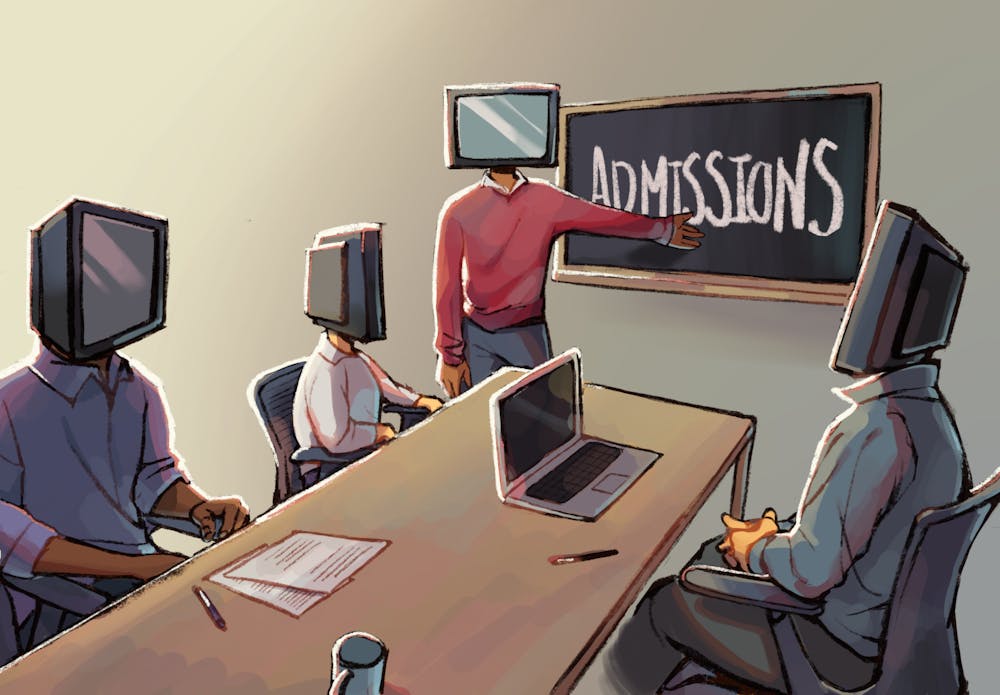With its ability to help brainstorm essay ideas and practice for interviews, artificial intelligence has a myriad of potential uses in the college application process. A paper published in the Academic Medicine journal in September, authored by Penn professor Kevin Johnson and his colleagues, explores these potential uses in medical school applications and posits that they could reshape access to resources in the application process.
AI allows applicants to “generate eloquent prose based on their thinking,” Johnson told The Herald.
As it stands currently, the University’s policy is “that students should not use AI in any portion of their own application submission,” Logan Powell, associate provost for enrollment and dean of admission, told The Herald.
Sara Harberson, an independent college counselor, has already encountered college essays that have clearly utilized ChatGPT: “I tell them, this isn't going to fly for me, and it's not going to fly for colleges.”
When looking at examples of AI-generated essays published by the New York Times, Powell noted that — beyond “technically correct sentences and paragraphs” — he has not noticed “anything that is really superlative or deeply moving or personal” in the responses.
The Common Application, one of the main ways through which prospective students apply to Brown and over a thousand other schools, requires that all applicants attest that all submitted materials are “my own work.”

Johnson believes that AI can be used as a tool to remedy the inequities that currently exist in the college application process. An hour of college application advising costs an average of $200 per hour and a poll conducted by The Herald found that first-year students were more likely to have hired counselors if they received no financial aid, attended a private high school and did not identify as a first-generation student.
It is important that universities study the potential for AI to “tutor parts of the application,” Johnson said. AI could lead to “marginal improvement” of a candidate’s submission, and that should not be overlooked.
He suggested a model where applicants are given the opportunity to submit the information they provided to a ChatGPT or another generative tool as part of their application. Admission officers could then use the “output of their prompt,” along with the prompt itself, to understand the thinking behind the applicants’ “brilliant ideas,” he said.
Johnson added that he wishes there was a space to disclose resources beyond AI used during application creation, including independent college counselors. “Could you imagine if we were requiring a college counselor to say, ‘Here's how many times I’ve met with this student’?” he asked. “It would be fascinating, but in our current world, we don't ask that.”
When advising applicants, Harberson has been encouraging students to not rely on AI and “use their own brains to fill out every section of the application.”
Harberson does believe that AI could prove beneficial for universities that are facing “enormous applicant pools,” citing the rising number of college applications in recent years.
But most colleges have been reluctant to incorporate AI technology into admission practices on the receiving end of applications.
Powell said that the Office of Undergraduate Admission has no plans to incorporate AI in application review: “We are really deeply committed to a human-centric process.”
Brown is “deeply committed to having individual admission officers review the individual applications from students interested in joining the Brown community,” he said.

Owen Dahlkamp was the managing editor of newsroom on The Herald's 135th Editorial Board, overseeing the paper's news operations. Hailing from San Diego, CA, he is concentrating in Political Science and Cognitive Neuroscience with an interest in data analytics. In his free time, you can find him making spreadsheets at Coffee Exchange.





